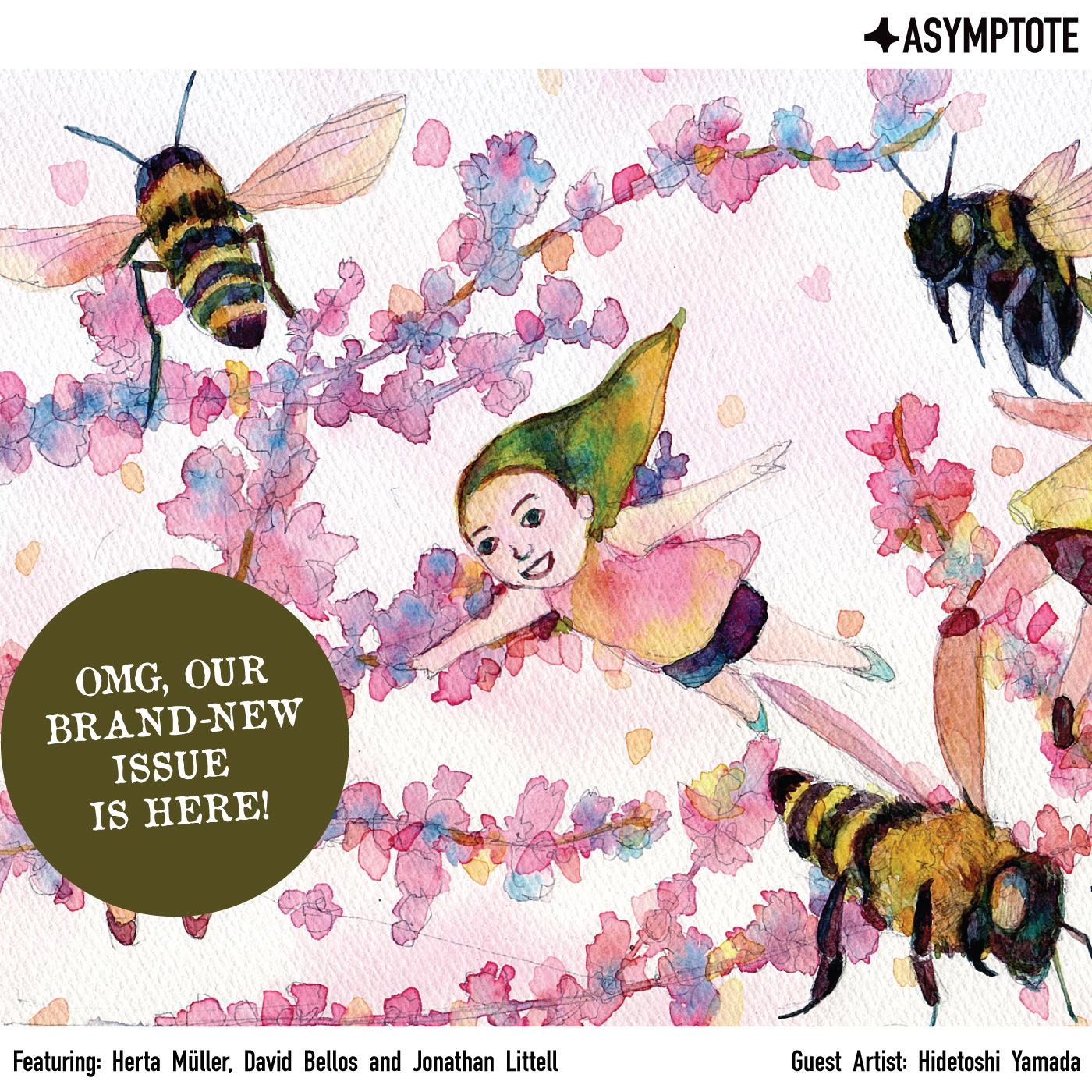What are you waiting for? Highlights from Asymptote’s Spring 2014 issue include new work by Nobel laureate Herta Müller, David Bellos (author of “Is that a Fish in Your Ear?”), and Prix Goncourt-winner Jonathan Littell. Plus, our annual English-language fiction feature spotlights Diasporic literature from Bosnia, China, India, Japan, and Singapore.
Although Asymptote’s authors and translators are separated by location, language, and time zone, they are unified by their daring explorations into the barriers—and possibilities—of language. We’re delighted to share some of the issue’s freshly unearthed treasures with you today, available for free on the journal’s website. Here’s a tempting glimpse of what you can expect:
From “Brief Notes on Science,” a novel look at the scientific method by Brazilian buzz author Gonçalo Tavares:
How would it be possible to proceed toward Mystery? Toward that which I do not know?
If I proceed toward Mystery it is because the Mystery has already been solved by me.
If such a thing were to happen at the circus, people would call it a farce.
You already know where they hid the jewel (you were the one who hid it) and now you’re asking them to put a blindfold over your eyes.
What are you doing, they ask you.
Investigating, you reply.
From Adrian West’s introduction to Marianne Fritz, an author revered by Jelinek and Sebald (and hated by Bernhard), but virtually unknown abroad:
It is possible that a fictional topos as dense and expansive as Fritz’s is inconceivable outside of such isolating circumstances; that like a phantom limb, such imagined worlds may arise only after conventional reality has been hewn away. To say this is not to reduce Fritz’s work to aleatory hallucinations or to question her artistic integrity. On the contrary, just as Rimbaud argued for the systematic derangement of the senses, Fritz’s subjection of herself to the conditions necessary to reconceive the situation of war in all its staggering complexity must be considered a conscious, programmatic gesture.
From “I Call My Brothers,” a new play by Obie award-winning playwright Jonas Hassen Khemiri:
3: Observe:
1: The clothes should be anonymous.
4: But the clothes should not be too anonymous.
2: They must not be so anonymous that they stick out in their anonymity.
3: Exactly.
4: The goal is to blend in.
3: The goal is to become invisible.
1: Leave your keffiyeh at home.
2: Do not carry a suspicious bag.
4: There. Now you’re ready.
3: Now you can leave your homes.
From Nobel-winner Herta Müller’s “The Space Between Languages,” a speech in honor of fellow writer, Radka Denemarková:
It is from the space between languages that images emerge. Each sentence is a way of looking at things, crafted by its speakers in a very particular way. Each language sees the world differently, inventing its entire vocabulary from its own perspective and weaving it into the web of its grammar in its own way. Each language has different eyes sitting inside its words.
From the fiction section, “The Ears of the Wolf,” by Antonio Ungar:
I feel like I’m going to choke from fear and the good fortune of being able to participate in this ritual, that I’m going to faint out of admiration for that girl who is no longer a girl but rather a stiff body thousands of bees are walking on without stinging her (not one attacks her, as if they know how powerful she is), bees who are enjoying the honey, piled on top of each other, a swarm of little restless living beings, frantic, who deform my sister and make her magical, awesome, standing still in the middle of the garden.
Forget exercise, sleep, and personal hygiene (okay, maybe not that one), and explore the issue for even more:
• New translations of poetry by Sébastian Smirou, Lev Rubinstein, Yousef el Qedra, and Sakutaro Hagiwara;
• Interviews with video artist Grace Weir, translators Heather Cleary and Margaret Carson, and Bulgarian writer Katerina Stoykova-Klemer;
• And our first work from Angola, Botswana, Congo, and Uganda!
You’ve read this far, which means you must enjoy cutting-edge new literature and translations. If you would like to be a part of the Asymptote staff, check out our volunteer opportunities; or consider submitting works to the journal here or to the blog by e-mailing us at blog@asymptotejournal.com.
We’re hoping to conduct another translation contest soon, but we can only do that with your financial support—please donate today! Thank you!

